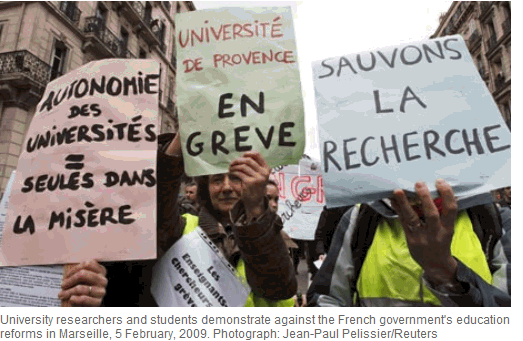|
|
|
|
|
|
|
News & Views item - April 2009 |
![]() Tumult
at French Universities and Research Institutions Set to Continue.
(April 23, 2009)
Tumult
at French Universities and Research Institutions Set to Continue.
(April 23, 2009)
 The
three months of university student blockades and staff strikes have driven the
French government to threaten that 2008-09 could become a lost academic year.
The
three months of university student blockades and staff strikes have driven the
French government to threaten that 2008-09 could become a lost academic year.
Angelique Chrisafis reporting for The Guardian writes that France is witnessing "the biggest higher education revolt in modern French history, surpassing the protests of May 1968 in terms of the numbers of academic staff who have gone on strike. [S]waths of researchers and lecturers have walked out on strike in protest at what the French president, Nicolas Sarkozy, had promised would be his most bold and daring reform: overhauling the crumbling French higher education system".
While most academics would agree that the dilapidated university sector needs significant reform, they have now joined protest movements opposing Sarkozy's style of implementation which they claim is an attempt to transform the universities into an industrial model, and the President is accused of displaying "contempt" for intellectuals.
Valérie Robert, a lecturer in German history at a Paris university, who has been on strike since January told Ms Chrisafis: "I couldn't have foreseen how radical a stance I've ended up taking, but the whole fabric of higher education is at stake; you can't measure universities like a factory in terms of economic success, we feel our freedom as academics and researchers is being totally curbed."
The French government estimates that currently 20 to 25 universities out of out of 83 are still affected by the protests, and strikers say that following the end of the Easter break others could rejoin the movement.
Meanwhile, Nature's Declan Butler has been following the progress of the recommendation of the critical report in November last year by the international panel led by Elias Zerhouni and including Harold Varmus, both former directors of the US National Institutes of Health, and Leszek Borysiewicz, head of the UK Medical Research Council, that concluded that life-science research needed a drastic shake-up, something that has not been well received by those in the gun.
The panel recommended that "a single research council be set up for the field, charged with funding labs in universities and research agencies" in order to overcome "the complexity and fragmentation of life sciences in France, and the proliferation of duplicated programmes and regional clusters of research".
As a first step the French government is engineering the setting up of a "National Alliance for Life and Health Sciences comprising eight bodies, including France's basic-research agency (CNRS), the national biomedical agency (INSERM) and the Pasteur Institute, based in Paris; it will develop and coordinate national strategies in the life sciences and rationalize overlap between its members".
Not surprisingly those to be effected see dragons because "the alliance will coordinate the planning for a research strategy on ten themes across all agencies", and Mr Butler reports: "Internal government working documents have also called for the alliance to be the embryo of a life-sciences agency."
As matters stand a steering committee, of the eight heads of the bodies involved, are to hold monthly meetings "to develop the strategy for their partnership".
All things considered it might be easier to herd cats, and it's probably just as well for the participants of that international consultative panel to be out of the firing line. But the fact is the intransigence of all those involved is actively diminishing the effectiveness of French academe in general as well as French science.